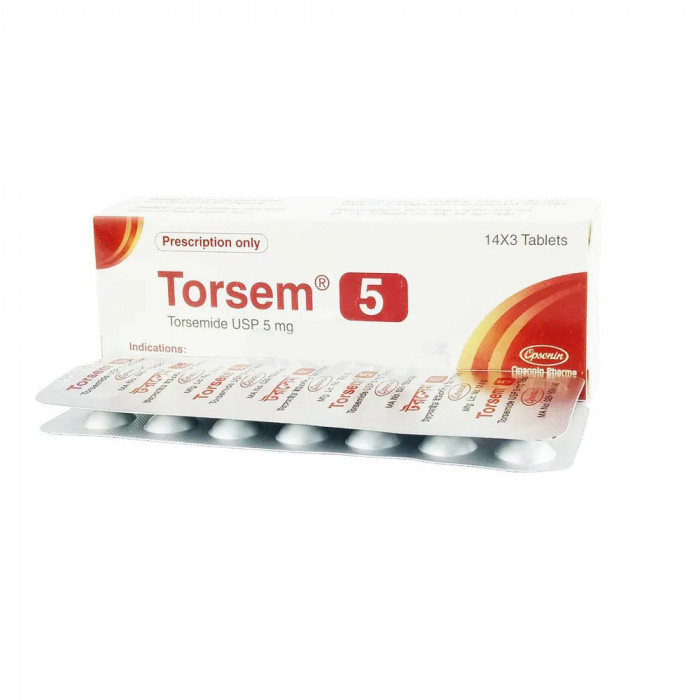
✔ 100% Authentic Product
👁️ Currently Viewing 2147
Torsem is prescribed for managing edema associated with heart failure, chronic kidney disease, or liver cirrhosis. It is also effective in treating hypertension, either on its own or in combination with other antihypertensive agents.
Discount
Price: ৳ 80
MRP:
৳
84
5%
Off

100% Genuine Products, Guaranteed

Safe & Secure Payments, Always

Fast, Secure & Efficient Delivery

Proper Packaging
 Cash on Delivery - All over Bangladesh
Cash on Delivery - All over Bangladesh Regular Delivery - 12-24 Hours, Dhaka City* Charge Tk.39-59
Regular Delivery - 12-24 Hours, Dhaka City* Charge Tk.39-59 Regular Delivery - 24-48 Hours, Other Cities* Charge Tk.99-110
Regular Delivery - 24-48 Hours, Other Cities* Charge Tk.99-110
🌙 রমযান অফার 🌙
 ফ্রি ডেলিভারিঃ - ৭৯৯ টাকা+ অর্ডারে, ঢাকা
শহরে
ফ্রি ডেলিভারিঃ - ৭৯৯ টাকা+ অর্ডারে, ঢাকা
শহরে ফ্রি ডেলিভারিঃ - ২৭৯৯ টাকা+ অর্ডারে, ঢাকার
বাহিরে
ফ্রি ডেলিভারিঃ - ২৭৯৯ টাকা+ অর্ডারে, ঢাকার
বাহিরে
📲 মোবাইল অ্যাপ অর্ডারে সাশ্রয় বেশী
-
Google Play Store থেকে ডাউনলোড
-
Apple Store থেকে ডাউনলোড
100% Genuine Products, Guaranteed
Safe & Secure Payments, Always
Fast, Secure & Efficient Delivery
Proper Packaging
 Cash on Delivery - All over Bangladesh
Cash on Delivery - All over Bangladesh Regular Delivery - 12-24 Hours, Dhaka City* Charge Tk.39-59
Regular Delivery - 12-24 Hours, Dhaka City* Charge Tk.39-59 Regular Delivery - 24-48 Hours, Other Cities* Charge Tk.99-110
Regular Delivery - 24-48 Hours, Other Cities* Charge Tk.99-110 ফ্রি ডেলিভারিঃ - ৭৯৯ টাকা+ অর্ডারে, ঢাকা
শহরে
ফ্রি ডেলিভারিঃ - ৭৯৯ টাকা+ অর্ডারে, ঢাকা
শহরে ফ্রি ডেলিভারিঃ - ২৭৯৯ টাকা+ অর্ডারে, ঢাকার
বাহিরে
ফ্রি ডেলিভারিঃ - ২৭৯৯ টাকা+ অর্ডারে, ঢাকার
বাহিরে- Google Play Store থেকে ডাউনলোড
- Apple Store থেকে ডাউনলোড
🌙 রমযান অফার 🌙
📲 মোবাইল অ্যাপ অর্ডারে সাশ্রয় বেশী
✅ Description:
Torasemide, a loop diuretic, works by inhibiting the Na⁺/K⁺/2Cl⁻ cotransport system located in the thick ascending limb of the loop of Henle. This action blocks sodium and chloride reabsorption, increasing urinary output of sodium, chloride, and water. It indirectly promotes potassium loss by enhancing sodium delivery to the distal tubules. While it significantly boosts diuresis, torasemide does not markedly affect glomerular filtration rate, renal plasma flow, or acid-base balance. Its antihypertensive effect stems from the reduction in extracellular fluid and plasma volume, leading to decreased cardiac output and blood pressure.
✔️ Torsem 5 Generally well-tolerated. Possible side effects include:
- Dizziness, fatigue
- Dry mouth
- Nausea, vomiting, diarrhea, constipation
- Orthostatic hypotension
- Skin rash
- Muscle cramps
✔️ Dosage & Administration of Torsem 5
Edema due to Congestive Heart Failure:
Start with 10–20 mg orally once daily. Increase the dose by doubling gradually if needed. Doses above 200 mg have not been studied.
Chronic Renal Failure:
Begin with 20 mg once daily, increasing gradually if necessary. The maximum studied dose is 200 mg.
Hepatic Cirrhosis:
Initial dose: 5–10 mg once daily, combined with a potassium-sparing agent or aldosterone antagonist. Adjust gradually as needed. Doses above 40 mg have not been adequately evaluated.
Hypertension:
Start with 2.5–5 mg orally once daily. If blood pressure is not controlled within 4–6 weeks, increase to 10 mg once daily. If inadequate, consider adding another antihypertensive.
✔️ Overdose Management
Symptoms may include dehydration, hypotension, electrolyte imbalance, especially hypokalemia. Treatment involves supportive care with fluid and electrolyte replacement.
✔️ Drug Interactions
- Increased risk of hypokalemia when used with amphotericin B, corticosteroids, or other potassium-depleting agents.
- May enhance digoxin and lithium toxicity.
- May increase the risk of ototoxicity/nephrotoxicity when combined with aminoglycosides or similar drugs.
- NSAIDs may reduce diuretic efficacy.
- Antihypertensives may enhance blood pressure-lowering effects.
- High-dose salicylates may increase toxicity.
✔️ Contraindications
- Known hypersensitivity to torasemide or sulfonylureas.
- Anuria (no urine output).
✔️ Use in Pregnancy & Lactation
Pregnancy: Use only if needed, as adequate human studies are lacking.
Breastfeeding: Unknown if excreted in breast milk; caution is advised.
✔️ Precautions
Use with care in patients with diabetes, hypotension, gout, or liver disease.
Monitor fluid and electrolyte balance closely, especially in elderly or debilitated patients.
✔️ Storage
Keep at room temperature (below 30°C) in a cool, dry place, protected from light and moisture. Keep out of reach of children.
⚠️Disclaimer:
At ePharma, we’re committed to providing accurate and accessible health information. However, all content is intended for informational purposes only and should not replace medical advice from a qualified physician. Please consult your healthcare provider for personalized guidance. We aim to support, not substitute, the doctor-patient relationship.






